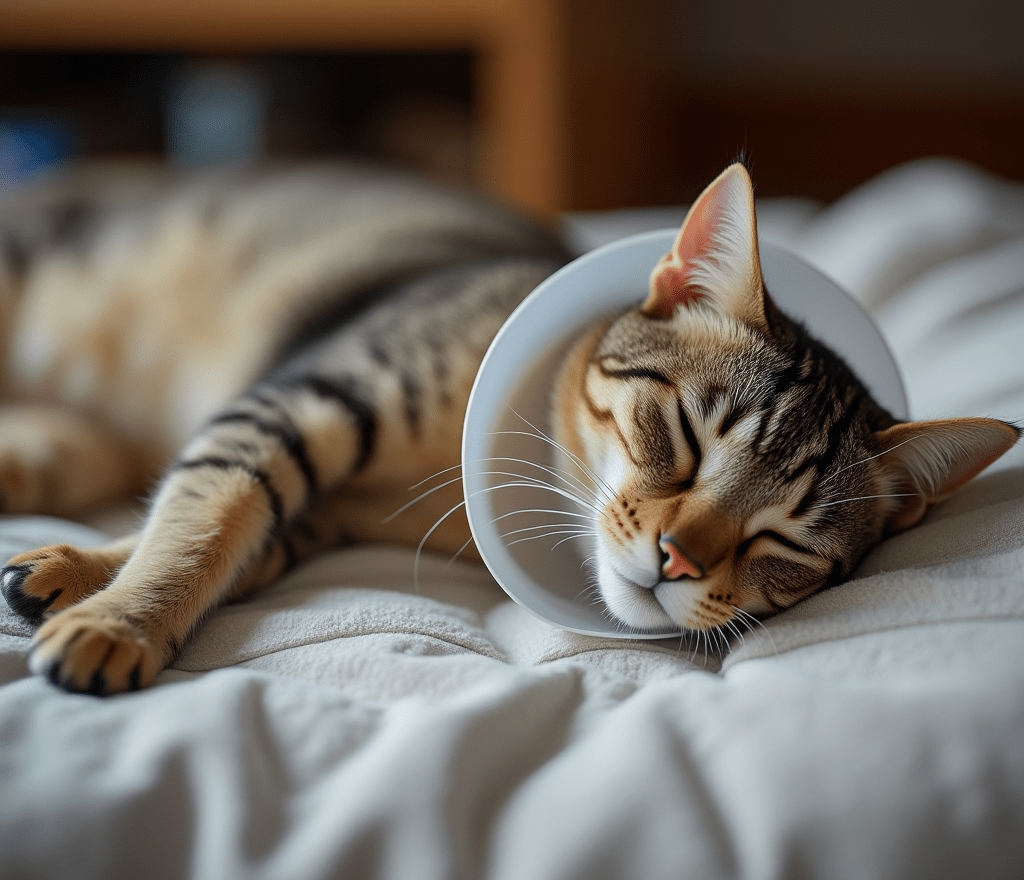Male Cat Behavior After Neutering: f you’re reading this, chances are you’ve decided to neuter your male cat and are curious about how it may change his behavior. Maybe you’re hoping to curb unwanted habits, or you want him to have a calmer, more content life. The choice to neuter a cat is a big step and can bring about various adjustments. While neutering is largely positive for both health and behavior, it’s normal to wonder exactly what to expect. This guide will help you navigate this transition, understanding the behaviors that might emerge, the ways to support your cat through them, and how to foster a happy, healthy relationship together.
Table of Contents
Why Neutering Is Important for Male Cats
Neutering is a common and responsible choice for most cat owners, offering numerous advantages for both you and your cat. Here’s a look at why neutering male cats is recommended and how it benefits their overall health and well-being.
Health Benefits of Neutering
Neutering is known to bring significant health advantages to male cats. Firstly, it drastically reduces the risk of certain diseases. For instance, testicular cancer is completely eliminated in neutered males, and their likelihood of developing prostate issues is also reduced. Lower testosterone levels, due to neutering, contribute to an overall decrease in risky behaviors such as roaming and fighting, which often lead to injuries.
By limiting the impulse to wander, neutering decreases the chance of accidents, infections, and exposure to harmful outdoor environments. In other words, a neutered male cat is less prone to contracting infectious diseases or encountering dangerous situations.

Behavioral Benefits of Neutering
From a behavioral standpoint, neutering brings about several desirable changes. Male cats are typically more territorial and can exhibit aggression towards other animals or people. Neutering helps manage this by reducing testosterone levels, often making them calmer and less likely to display aggression or dominance behaviors.
Neutering also helps curb instinctual behaviors like marking or “spraying” territory. A neutered cat is generally less inclined to mark his territory indoors, an issue many cat owners are eager to resolve. Let’s dive deeper into the specific behavior changes you may observe after neutering.
What Behavioral Changes Can You Expect After Neutering?
It’s important to note that every cat is unique, and behavior changes don’t occur overnight. For some cats, you might notice immediate shifts, while for others, these changes are gradual. Here’s a closer look at common behavior shifts that might come about after neutering your male cat.
Decrease in Aggression and Dominance
One of the most noticeable shifts you may observe post-neutering is a reduction in aggression. Male cats are naturally territorial, and unneutered males often display hostility toward other cats, especially if they sense another male nearby.
Less Territorial Aggression
With neutering, testosterone levels drop, and the drive to protect or claim territory becomes less intense. You might notice that your cat becomes more tolerant of other pets and less likely to engage in territorial disputes.
Reduction in Fighting and Hostility
The urge to fight or assert dominance is also reduced. This means fewer instances of rough play, biting, or challenging other animals. You may see a gentler side of your cat as he becomes less reactive and less inclined toward confrontational behaviors.
Decrease in Spraying and Marking
One of the more frustrating behaviors for cat owners is spraying, a natural way for male cats to mark territory. Neutering can significantly reduce this habit, though it may take a few weeks or even months for the behavior to phase out entirely.
Why Male Cats Spray and How Neutering Helps
Spraying is often hormone-driven, meant to signal to other cats that a territory is claimed. After neutering, the hormones that drive this behavior are no longer as active, reducing the likelihood of marking.
Tips to Reduce Residual Spraying
If your cat continues to spray, even sporadically, you can discourage this behavior by cleaning previously marked areas with enzyme cleaners, which remove the scent markers that cats are drawn to. Additionally, providing plenty of scratching posts and interactive toys can keep your cat mentally engaged, helping to divert his focus away from territorial marking.
Changes in Activity Levels and Playfulness
You may also observe adjustments in your cat’s activity levels post-neutering. While not all cats become less active, a reduction in testosterone generally leads to slightly lower energy levels.
Lower Energy Levels and Calmer Demeanor
A neutered male may not feel the constant drive to roam, which can result in a calmer temperament. This does not mean he’ll become lazy; rather, you may notice he’s more relaxed around the house and less prone to restless behaviors.
New Play Preferences
Post-neutering, some cats shift toward less aggressive play styles, preferring softer interactions. You can help him stay active and entertained by introducing interactive toys that stimulate his mind, such as puzzle feeders or laser pointers. Cats need both mental and physical stimulation, so providing a mix of engaging activities can help him adjust to his new, calmer nature.
Potential Weight Gain and Dietary Adjustments
One of the less desirable effects of neutering is a tendency toward weight gain, as the reduction in testosterone can slow down a cat’s metabolism. Without adjustments in diet and exercise, your cat might start to put on extra pounds.
Why Neutered Cats May Gain Weight
Neutered males often experience an increase in appetite while their physical activity might decrease, leading to an imbalance in calorie intake and expenditure. While this is normal, it can be managed effectively.
Preventing Obesity in Neutered Cats
Consider shifting your cat to a diet that is lower in calories yet still nutritious. There are specialized formulas designed specifically for neutered or less active cats. Daily play sessions can also help keep him moving and prevent unwanted weight gain. Taking proactive steps can ensure your cat remains healthy without sacrificing any comfort.
Supporting Your Cat Emotionally and Physically After Neutering
The post-neutering phase requires not only physical recovery but also emotional support. Your cat may feel out of sorts after the procedure, and your role is to help him transition smoothly. Here’s how you can make him feel secure and comfortable.
Provide a Comfortable Healing Environment
Rest and Recovery Essentials
Right after the surgery, your cat will need a quiet and cozy space where he can rest without disturbances. Ensure he has a warm, clean bed and avoid letting other pets near him while he recovers.
Monitor Behavior for Signs of Stress or Pain
Watch for symptoms like excessive licking at the incision site, a decrease in appetite, or hiding behavior, as these could signal discomfort. If these signs persist, it’s best to contact your vet for advice on alleviating any pain your cat might feel.
Create a Routine for Security and Stability
Cats thrive on routine, and establishing a predictable schedule can make the transition after neutering much smoother.
Establish Consistent Feeding and Play Times
Routine can help reduce any lingering stress, making your cat feel more secure. Stick to regular feeding and play schedules, allowing him to anticipate these moments and feel a sense of stability in his day.
Provide Interactive Toys and Scratching Posts
Keeping your cat mentally stimulated is key to helping him adjust. Interactive toys that dispense treats or require problem-solving can keep him engaged and focused on positive activities. Scratching posts, too, give him an outlet for his energy and reduce the need for marking.
FAQ About Male Cat Behavior After Neutering
Will My Male Cat’s Personality Change After Neutering?
Generally, a cat’s core personality remains the same post-neutering. You may notice that he’s less prone to aggression or restlessness, but his unique quirks and traits will remain intact.
How Long Does It Take for Behavior Changes to Appear?
While some changes, like a reduction in marking or aggression, may appear within a few weeks, full behavioral adjustments can take several months. Give him time to adapt to the hormonal shift and settle into his new routine.
Can Neutering Help Reduce My Cat’s Tendency to Roam?
Yes, neutering often decreases a male cat’s urge to roam, as the drive to find mates diminishes. This can enhance his safety by reducing his exposure to potential dangers outdoors.
Why Is My Cat Still Spraying After Being Neutered?
Sometimes, spraying can persist out of habit or stress. Cleaning previously marked areas with enzymatic cleaners can help reduce this behavior. Give him time to adjust, as it may gradually fade.
How Can I Help My Neutered Cat Avoid Weight Gain?
Switching to a balanced diet specifically designed for neutered cats, along with regular play, can help keep your cat at a healthy weight.
Conclusion
Choosing to neuter your male cat is a decision that offers long-term health and behavior benefits. With the proper understanding and support, this transition can be smooth, paving the way for a content, well-adjusted cat. Behavior changes like reduced aggression, less roaming, and minimized marking are common, and with a little help from you, your cat can adapt well to these new norms.
Remember, patience is key. Adjustments take time, and by providing a stable environment, interactive play, and a routine that makes him feel secure, you’re setting your cat up for a happy and comfortable life with you.
Ready to help your cat thrive post-neutering? Start by creating a routine that suits his new needs and explore enrichment options that keep him both active and engaged. Your bond will only grow as you support him through this transition.






